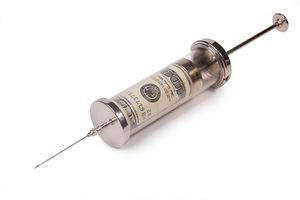“The pharmaceutical companies are an amoral bunch. They’re not a benevolent association. So they are highly unlikely to donate large amounts of money without strings attached. Once one is dancing with the devil, you don’t always get to call the steps of the dance.”—A psychiatrist, quoted in the Boston Globe, 2002.
The New England Journal of Medicine, under the editorship of Marcia Angell, MD, published a study in the May 18, 2000 issue whose principle author was the chief of Brown University’s Department of Psychiatry. The academic psychiatrist had reportedly made $500,000 in one year doing consultancy “work” for various psycho-pharmaceutical companies that marketed antidepressant drugs. In editing the article, Dr Angell discovered that there wasn’t enough room to print all the various co-author’s conflict of interest disclosures. Because of space limitations, Angell put the full list on the website rather than in the hard copy issue.
In a footnote to the article, she wrote:
Our policy requires authors of Original Articles to disclose all financial ties with companies that make the products under study… In this case, the large number of authors and their varied and extensive financial associations with relevant companies make a detailed listing here impractical. Readers should know, however, that all but one of the twelve principal authors have had financial associations with Bristol-Myers Squibb – which also sponsored the study – and, in most cases, with many other companies producing psychoactive pharmaceutical agents. The associations include consultancies, receipt of research grants and honorariums, and participation on advisory boards.
Angell then proceeded to write an editorial in the same issue. It was titled, “Is Academic Medicine for Sale?” In it she expressed her concern about the merging of commercial and academic interests.

